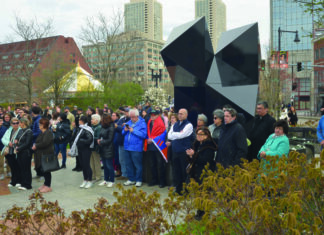Text by Mark Mathosian and Joey Steuber
ADVANCE, N.C. — America’s WWII veterans are in their 80s and 90s and dying off at an alarming rate. Today, there are several organizations rushing to preserve the personal accounts of those brave American veterans who risked their lives to assure the world would be free from Nazi domination. When our country needed volunteers to fight the Nazis and Japanese, many American Armenians volunteered for the Army, Navy, Marines and Air Force. This article is the story of two brave American Armenians who risked their lives to assure future generations would live free. In the introduction we can suggest to all American Armenians that it is not too late to document the histories of their brave relatives from the WWII so they too can be remembered for their role in preserving democracy.

The years 2008 and 2009 were not good years for the Mathosian family. My father, George Mathosian, and his brother, Archie Mathosian, passed on within months of each other. Both were in their 80s. Both were much loved and respected by family and friends. They were easygoing people with a gusto for life and a kind word for all. George and Archie served America during World War II by entering US military service. George was in the US Army and Archie was in the Army Air Force.
The two brothers saw much action; George through the windshield of his military command car while driving over the bombed out roads of France, Belgium and Germany and Archie from his rocky seat in a B-17 bomber flying high over European cities and countryside.
Like many of their generation they didn’t ask for praise or accolades for serving their country. When asked about their military days they replied by simply saying they had done their duty for their country. It always took a little pressure to get details, which we were anxious to hear. This is their story and I hope it sparks an interest in readers to retrace the steps of soldiers in their families, America’s citizen soldiers.
George Mathosian, Tec 5 749th Tank Battalion Service Company, by Joseph (Joey) Steuber, George Mathosian’s grandson:









